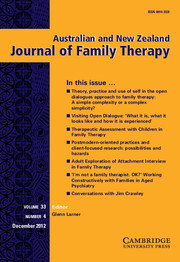Article contents
The Bowl of Terror: A Case Study of an Adolescent Perpetrator of Sexual Abuse
Published online by Cambridge University Press: 02 March 2012
Abstract
This article describes a complex multimodal intervention with a family where inappropriate sexual contact had occurred between Taro and his younger sister Lara, when they were young children. The family presented to clinical services when Lara was brought to hospital with suicidal ideation, traumatic flashbacks and regressed behaviour at 13 years of age. Treatment involved multiple components: family work with all members of the family, individual work with Lara, joint work with Lara and Taro, and finally, a brief intervention with Taro. This article focuses primarily on the therapist's work with Taro, the perpetrator of the inappropriate sexual contact. The Adult Attachment interview (AAI), a semi-structured interview, was used by the therapist to assess Taro's developmental experiences and psychological functioning. Information from the AAI helped the therapist identify both the relationship factors that had contributed to the perpetration of sexual abuse and the self-protective strategies Taro had come to use in order to elicit maximum comfort and protection from neglectful attachment figures. The therapist used the functional formulation derived from the AAI to structure a time-limited intervention.
Keywords
- Type
- Articles
- Information
- Australian and New Zealand Journal of Family Therapy , Volume 31 , Issue 1 , 01 March 2010 , pp. 43 - 59
- Copyright
- Copyright © Cambridge University Press 2010
- 5
- Cited by


